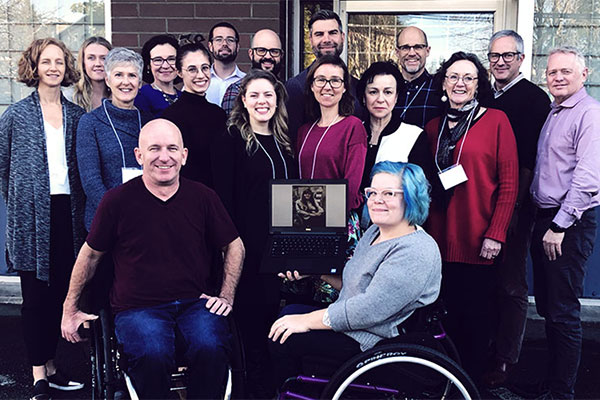
What are the IKT Guiding Principles?
A multidisciplinary group of SCI researchers, clinicians, people with SCI, representatives from SCI community organizations, and funding agencies developed the Integrated Knowledge Translation (IKT) Guiding Principles to support IKT partnerships to conduct quality, ethical research in spinal cord injury (SCI) that is relevant, useful, useable, and avoids tokenism.
The Guiding Principles have been developed to be used by all partners – researchers, research users, and funders of SCI research – early and throughout the entire research process. Partners should regularly refer to these principles while reflecting on their approach, contributions, and commitment to the partnership and adjust as needed.
Data supporting the effectiveness of the IKT guiding principles are not yet available. For this reason, these are guiding principles and not guidelines.
The IKT Guiding Principles
To engage more meaningfully in research that is relevant, useful, and/or useable, the IKT guiding principles are:
![]() Partners develop and maintain relationships based on trust, respect, dignity, and transparency.
Partners develop and maintain relationships based on trust, respect, dignity, and transparency.
![]() Partners share in decision-making.
Partners share in decision-making.
![]() Partners foster open, honest, and responsive communication.
Partners foster open, honest, and responsive communication.
![]() Partners recognize, value, and share their diverse expertise and knowledge.
Partners recognize, value, and share their diverse expertise and knowledge.
![]() Partners are flexible and receptive in tailoring the research approach to match the aims and context of the project.
Partners are flexible and receptive in tailoring the research approach to match the aims and context of the project.
![]() Partners can meaningfully benefit by participating in the partnership.
Partners can meaningfully benefit by participating in the partnership.
![]() Partners address ethical considerations.
Partners address ethical considerations.
![]() Partners respect the practical considerations and financial constraints of all partners.
Partners respect the practical considerations and financial constraints of all partners.
Glossary of Terms
Integrated knowledge translation (IKT)
Meaningful engagement of the right research users at the right time throughout the SCI research process.
Meaningful engagement
Contributing to and influencing a personal and socially meaningful research, dissemination, and/or implementation goal and feeling a sense of responsibility to others (e.g. the research team, organizations, people with lived experience of SCI, etc.).
Partners or partnership
Researchers and research users meaningfully engaging throughout the research process.
Principles
Fundamental norms, rules, or beliefs that represent what is desirable and positive for a person, group, organization, or community, and help it in determining the rightfulness or wrongfulness of its actions. Principles are more basic than policy and objectives and are meant to govern both.
Research
The systematic study of a topic in order to understand and/or discover information about the topic.
Research process
Multiple phases in a research project. Phases include but are not limited to planning, conducting, disseminating, and applying the research.
Research users
Individuals or groups that will use or benefit from the research. These groups are different than research participants and include but are not limited to persons with lived experience of SCI, policy-makers, health and/or service providers, other researchers, professional organizations, funders, and industry partners. The partnership should carefully consider who the right research user(s) is/are for its project.
Researcher
A person whose job it is to carry out research activities.
Tokenism
The practice of making only a minimum or symbolic effort to do a particular thing, especially by recruiting a small number of people from under-represented groups in order to give the appearance of equality. Tokenism happens when a partner is asked to endorse, and therefore legitimize, research programs over which they have little real influence or control.
Learn More
Note. This website uses web analytics tools to help analyze how the site and our principles are used, and to improve visitors’ online experience. For more information, please refer to UBC’s ‘Terms of Use‘ link below or contact our team.




